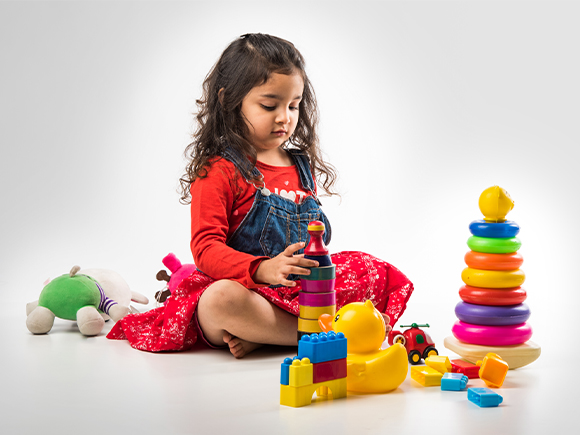Parents can support the development of speech and language skills in young children through various methods at home. Here are some approaches:
Talk to Your Toddler: Engage in conversations with your toddler throughout the day; talk to them about toys to describe the actions, locations, and properties of toys and objects in the environment. Use simple words and sentences to help them understand and learn new words.2
Read Aloud: Reading to your toddler regularly can help expand their vocabulary, improve listening skills, and foster a love for books. Choose age-appropriate books with colorful pictures and engaging stories. Point to pictures and name objects, characters, and actions to help them associate words with meanings.2,3
Sing and Rhyme: Singing nursery rhymes and songs can be a fun way to introduce new words and sounds to your toddler. Encourage them to sing along and repeat after you.3,4
Listen and Respond: Encourage your toddlers to express themselves and listen attentively when they attempt to speak. Respond to their efforts with enthusiasm, which will reinforce their desire to communicate.2,5
Limit Screen Time: Limit their exposure to screens, including televisions, tablets, and smartphones, as these can replace valuable face-to-face interaction and language learning experiences.6
Storytelling Together: When you talk with your child about past events, help them put their memories into words. Use interesting details to show them how to tell stories. This practice can strengthen children's thinking skills and enhance their awareness of speech sounds and higher-order symbolic skills.4
Provide Opportunities for Social Interaction: Arrange playdates or enroll your toddler in activities where they can interact with other children of their age. Kids learn by imitating. When kids play with other kids, they learn from each other, and even at times, they learn how to respond.Interaction with other kids can also help them get better at listening and understanding how to speak at their turn. 7
Utilize Warmth and Prompts: Incorporate warmth and prompts in your interactions with toddlers to provide gentle encouragement for language development. Warmth involves showing positive affect, supporting toddlers’ independence, and being warm and responsive to their behaviors. Prompts include using descriptions, verbal prompting, and modeling to facilitate language learning.4
By incorporating these practices into daily routines, parents can play a crucial role in supporting their children's language skills and their overall communication abilities.
Expert Opinion:
Dr. Shilpi Rajgarhia
MD (Pediatrics)
Senior Pediatrician,
Nourish Clinic, Faridabad.
Playing with your toddler is a great way to help them learn to talk. The more you play and talk together, the more words they hear. This helps them understand how sounds, words, and conversations work.
It also helps their brain develop and improves their language skills.
Ways to Help Your Toddler Learn More Words
Talk about daily activities by describing what you’re doing, like saying, ‘I’m washing these utensils.’ Read books, sing songs, and recite nursery rhymes together. Expand on their words; if your toddler says ‘train,’ you can respond with, ‘Yes, it’s a big red train.’ Give them time to respond after you talk, even if they don’t use the right words. Name body parts and clothes, making it a game by asking questions like, ‘Where is Baby’s mouth?’
References:
1. Riad R, Allodi MW, Siljehag E, et al. Language skills and well-being in early childhood education and care: A cross-sectional exploration in a Swedish context. Front Educ. 2023;8:963180.
2. Preza T, Hadley PA. Parent responsivity, language input, and the development of simple sentences. J Child Lang. 024;51(1):91–117.
3. Neuman SB, Copple C, Bredekamp S. Learning to read and write: Developmentally appropriate practices for young children. Washington, DC: National Association for the Education of Young Children, 2000.
4. Riordan J, Reese E, Das S, et al. Tender shoots: A randomized controlled trial of two shared-reading approaches for enhancing parent-child interactions and children’s oral language and literacy skills. Scientific Studies of Reading. 2022;26(3):183–203.
5. Grady JS. Parental gentle encouragement promotes shy toddlers’ regulation in social contexts. J Exp. Child Psychol.
2019;186:83–98.
6. American Academy of Paediatrics. Media and young minds. Available at: https://publications.aap.org/pediatrics/article/138/5/e20162591/60503/Media-and-Young-Minds. Accessed on: 14 March 2024.
7. Mashburn AJ, Justice LM, Downer JT, et al. Peer effects on children’s language achievement during pre-kindergarten. Child Dev.
2009;80(3):686–702.



































